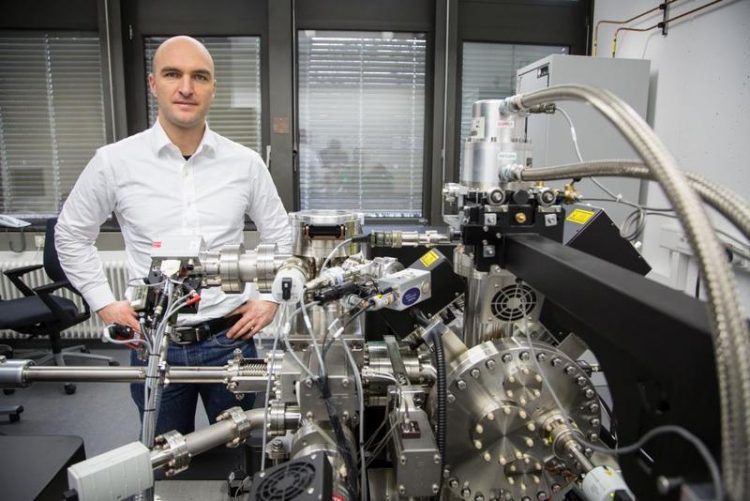A love of steel

FAU junior professor Peter Felfer receives ERC Starting Grant of 1.5 million euros. FAU/Georg Pöhlein
‘The importance of steel will become clearer over the next few decades, as hydrogen becomes a key fuel and steel tanks are needed to store it,’ predicts Felfer. Hydrogen is the arch-enemy of steel. When penetrated by hydrogen, steel quickly becomes fragile and brittle. Scientists have been aware of this problem for over 150 years.
However, they have not yet been able to discover which mechanisms lead to this corrosion. Further research in this area is critical, as vast investments will be made in infrastructure for storing and transporting hydrogen in the coming decades.
‘Using any material other than steel in this infrastructure is not financially feasible,’ says Felfer. ‘The ERC grant means that we can now begin to investigate the damage caused by hydrogen at the atomic level.’
Felfer first noted the potential of this research ten years ago while writing his graduate thesis at MU Leoben. In his research, he used an atom probe to analyse the atomic structure of materials and assemble computer models from this data.
‘Current atom probes are not capable of differentiating between hydrogen present in the measuring environment and in the material,’ says Felfer. The ERC grant will help Felfer to build an atom probe which is largely free of hydrogen. Although this is a complex and costly endeavour, Felfer hopes that this unique device will reveal the mechanisms behind hydrogen embrittlement in steel.
Felfer has been teaching and doing research in the Cluster of Excellence ‘Engineering of Advanced Materials’ since 2015 and is one of many FAU scientists interested in hydrogen. FAU has been long-established as a pioneering research university in energy technology.
Recently, a new Helmholtz Institute for Renewable energy was established at the Faculty of Engineering where intensive research is underway on hydrogen technology. “We are working together on finding solutions for all aspects of renewable energy,’ explains Felfer.
Prof. Dr. Peter Felfer
Phone: +49 9131 8527505
peter.felfer@fau.de
Media Contact
More Information:
http://www.fau.de/All latest news from the category: Materials Sciences
Materials management deals with the research, development, manufacturing and processing of raw and industrial materials. Key aspects here are biological and medical issues, which play an increasingly important role in this field.
innovations-report offers in-depth articles related to the development and application of materials and the structure and properties of new materials.
Newest articles

Superradiant atoms could push the boundaries of how precisely time can be measured
Superradiant atoms can help us measure time more precisely than ever. In a new study, researchers from the University of Copenhagen present a new method for measuring the time interval,…

Ion thermoelectric conversion devices for near room temperature
The electrode sheet of the thermoelectric device consists of ionic hydrogel, which is sandwiched between the electrodes to form, and the Prussian blue on the electrode undergoes a redox reaction…

Zap Energy achieves 37-million-degree temperatures in a compact device
New publication reports record electron temperatures for a small-scale, sheared-flow-stabilized Z-pinch fusion device. In the nine decades since humans first produced fusion reactions, only a few fusion technologies have demonstrated…





















